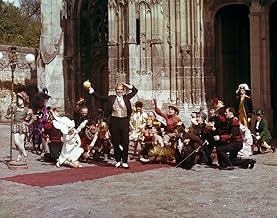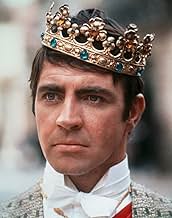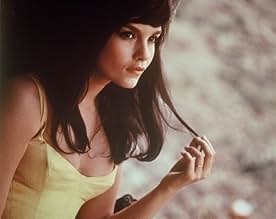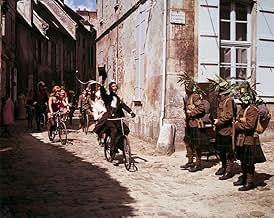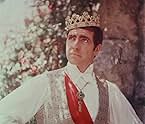PUNTUACIÓN EN IMDb
7,3/10
4,6 mil
TU PUNTUACIÓN
Durante la Primera Guerra Mundial, un soldado británico, enviado a una ciudad francesa para buscar la presencia del enemigo, es confundido con un rey por pacientes de un manicomio.Durante la Primera Guerra Mundial, un soldado británico, enviado a una ciudad francesa para buscar la presencia del enemigo, es confundido con un rey por pacientes de un manicomio.Durante la Primera Guerra Mundial, un soldado británico, enviado a una ciudad francesa para buscar la presencia del enemigo, es confundido con un rey por pacientes de un manicomio.
- Dirección
- Guión
- Reparto principal
Pier Paolo Capponi
- Un Officier Anglais
- (as Paolo Capponi)
Georges Adet
- L'aliéné-docteur
- (sin acreditar)
Jackie Blanchot
- Le Gabalou
- (sin acreditar)
Robert Blome
- Un aliéné
- (sin acreditar)
Jean-Marie Bon
- Un aliéné
- (sin acreditar)
Reseñas destacadas
Perhaps I am biased because the female lead, Genevieve Bujold (Coquelicot / Poppy) reminds me of a young French girl whom I fell in love with, and then lost, 40 years ago - the very same year that I first saw the film (1966 or early 1967).
But personal memories apart, it is stunning to watch how French director Philippe de Broca managed to fuse hilarious fun and melancholy reflection in a mold that is an incredible mixture. There is fairy tale, commedia dell'arte, circus, slapstick, comedy, romance - and World War I carnage. Among the supporting roles, the cast features some of the foremost French actors of those times; and it is obvious that they enjoyed every bit of it, especially as they put in a number of biting quips along with marvelous cameos.
This is what happens: For one day Private Charles Plumpick (Alan Bates) becomes, rather against his will, the mock king of a group of lunatics. This motley crowd have escaped from their asylum and have temporarily taken possession of a deserted town in Northern France between the 1918 front lines. Eventually Plumpick owes it to his lunatic friends that he survives when his Scottish battalion and their German counterpart meet in battle. There seems to be no way out of the madness of war. But don't miss the penultimate scene! (Rumour has it that it was censored in the American version at the time...)
My favorite scene is when young, innocent Coquelicot takes the shortest way from the brothel (well - it's a French film, isn't it?) to the town hall to meet her loved one, the King of Hearts - using two telegraph wires as a tightrope.
Why the film was a flop in its own country, and why neither a DVD or at least a video tape is available in France, I simply do not understand. Is it because only the French speak French but the Scots speak English and the Germans speak German? (Note de Broca himself, very early in the film, in a 5 second cameo as Private Adolf Hitler!) No need to worry - there are subtitles to help you along. Actually the DVD recently on sale in the USA *is* the original French version! Subtitled, and uncensored, to be sure.
I cannot deny that the film does have its shortcomings. The story is somewhat inconsistent, there seem to be goofs galore, continuity is lousy. But then it seems that de Broca had to make do with a lousy budget, too. And what he has created is essentially a dream which opposes to the nightmare of war a vision of humanity. In such dreams inconsistency, goofs and lousy continuity do not really matter. So it is still 10 out of 10.
But personal memories apart, it is stunning to watch how French director Philippe de Broca managed to fuse hilarious fun and melancholy reflection in a mold that is an incredible mixture. There is fairy tale, commedia dell'arte, circus, slapstick, comedy, romance - and World War I carnage. Among the supporting roles, the cast features some of the foremost French actors of those times; and it is obvious that they enjoyed every bit of it, especially as they put in a number of biting quips along with marvelous cameos.
This is what happens: For one day Private Charles Plumpick (Alan Bates) becomes, rather against his will, the mock king of a group of lunatics. This motley crowd have escaped from their asylum and have temporarily taken possession of a deserted town in Northern France between the 1918 front lines. Eventually Plumpick owes it to his lunatic friends that he survives when his Scottish battalion and their German counterpart meet in battle. There seems to be no way out of the madness of war. But don't miss the penultimate scene! (Rumour has it that it was censored in the American version at the time...)
My favorite scene is when young, innocent Coquelicot takes the shortest way from the brothel (well - it's a French film, isn't it?) to the town hall to meet her loved one, the King of Hearts - using two telegraph wires as a tightrope.
Why the film was a flop in its own country, and why neither a DVD or at least a video tape is available in France, I simply do not understand. Is it because only the French speak French but the Scots speak English and the Germans speak German? (Note de Broca himself, very early in the film, in a 5 second cameo as Private Adolf Hitler!) No need to worry - there are subtitles to help you along. Actually the DVD recently on sale in the USA *is* the original French version! Subtitled, and uncensored, to be sure.
I cannot deny that the film does have its shortcomings. The story is somewhat inconsistent, there seem to be goofs galore, continuity is lousy. But then it seems that de Broca had to make do with a lousy budget, too. And what he has created is essentially a dream which opposes to the nightmare of war a vision of humanity. In such dreams inconsistency, goofs and lousy continuity do not really matter. So it is still 10 out of 10.
10RDenial
As I was reading through the comments here for "King of Hearts" I noticed two different schools of thought on the film. Many, like myself, have fond memories of seeing this film in the 60s and 70s and were delighted by it. The other comments come from younger viewers who see this film as being "dated" and not that funny, yet worthwhile viewing. At first I was a little miffed at this generations comments about a gem of my generation, until it dawned on me that they were somewhat correct. The film is a bit dated because they just do not make films like this anymore. It was never meant to be knee slapping funny. The humor was a non-intrusive "gentle" humor that seems to be a foreign concept in this day and age. Another reason many younger viewers do not "get" this film is because one of the themes here is non-conformity. This was a crucial concern of those growing up in the 60s. We wanted our individuality to show and not be just a number. Society has did a 180 since then. Today people are more concerned with fitting in than standing out. So yes, this film possibly is a bit dated. It is a bit of movie magic from a far simpler time and I have a feeling that there are a lot of people under 30 who would not see this as dated at all. King of Hearts is one of a small handful of films that celebrates the simple magic of being alive. Come and experience it.
One of the biggest cult films of the 60s and 70s* is now back for a brief theatrical run on it's way to Blu Ray and Streaming courtesy of a new 4K Restoration by the Cohen Media Group to commemorate its 50th Anniversary. The restoration looks fine, if not extraordinary (it may look better on Blu-Ray since most theaters will be showing it via 2K DCP).
Reviewing the film for the first time is a bit tricky in light of its formidable cult history. At the time, it's success was often chalked up to as a counter-culture commentary on the insanity of the Vietnam War. By the 80s and 90s, KING got tabbed as 'of its time' and 'dated' (a term I despise).
In 2018? With distance, one can look at it as the timeless fable it always was at its core. A British soldier Plumpick (Alan Bates) is sent to a small German occupied village in WWI on a spy mission. Unbeknownst to the Allied forces, the village has already been evacuated and the Germans have also left (leaving a nasty surprise behind). In a bizarre turn of events, the village's only inhabitants are the patients at an insane asylum. The patients soon dub Plumpick their de facto ruler - 'The King of Hearts'. Not content with just a 'King', the patients dress up and become characters of their own - everything from Dukes and Duchesses, to Prostitutes and Madams. A particularly winsome lass, Coquelicot (Genevieve Bujold) is presented as a possible Queen to the 'King'.
There is much frivolity and preciousness on hand, much of it entertaining, and much of it cloying (and all of it will be found offensive to many people offended at its portrayal of the mentally ill). De Broca's direction and the script by Daniel Boulanger and Maurice Bessy moves in fits and starts. How enjoyable one finds it will depend on one's tolerance for such whimsy. The performances are energetic and its no wonder Bujold (in her yellow tutu) soon became an international name.
The film's message that the insanity of war would be no different with the actual 'insane' in charge (if not better off!) is facile, of course, but, one can see how it would have had resonance during a time of war, protest, assassinations and such. It's like Renoir's RULES OF THE GAME as played by mad fools. But, rather than just saying it's 'dated' and 'of its time' (just as facile, in my book), its better to just look at KING OF HEARTS as fairy-tale for all times. * After not doing much business in its initial run, KING OF HEARTS had a legendary 4 to 5 year run (depending on the source) at the now defunct Central Square Cinemas in Boston. During that period it spread to midnight shows, college campuses and revival houses across the country. It remained in regular revival house distribution into the 80s.
Reviewing the film for the first time is a bit tricky in light of its formidable cult history. At the time, it's success was often chalked up to as a counter-culture commentary on the insanity of the Vietnam War. By the 80s and 90s, KING got tabbed as 'of its time' and 'dated' (a term I despise).
In 2018? With distance, one can look at it as the timeless fable it always was at its core. A British soldier Plumpick (Alan Bates) is sent to a small German occupied village in WWI on a spy mission. Unbeknownst to the Allied forces, the village has already been evacuated and the Germans have also left (leaving a nasty surprise behind). In a bizarre turn of events, the village's only inhabitants are the patients at an insane asylum. The patients soon dub Plumpick their de facto ruler - 'The King of Hearts'. Not content with just a 'King', the patients dress up and become characters of their own - everything from Dukes and Duchesses, to Prostitutes and Madams. A particularly winsome lass, Coquelicot (Genevieve Bujold) is presented as a possible Queen to the 'King'.
There is much frivolity and preciousness on hand, much of it entertaining, and much of it cloying (and all of it will be found offensive to many people offended at its portrayal of the mentally ill). De Broca's direction and the script by Daniel Boulanger and Maurice Bessy moves in fits and starts. How enjoyable one finds it will depend on one's tolerance for such whimsy. The performances are energetic and its no wonder Bujold (in her yellow tutu) soon became an international name.
The film's message that the insanity of war would be no different with the actual 'insane' in charge (if not better off!) is facile, of course, but, one can see how it would have had resonance during a time of war, protest, assassinations and such. It's like Renoir's RULES OF THE GAME as played by mad fools. But, rather than just saying it's 'dated' and 'of its time' (just as facile, in my book), its better to just look at KING OF HEARTS as fairy-tale for all times. * After not doing much business in its initial run, KING OF HEARTS had a legendary 4 to 5 year run (depending on the source) at the now defunct Central Square Cinemas in Boston. During that period it spread to midnight shows, college campuses and revival houses across the country. It remained in regular revival house distribution into the 80s.
I saw King of Hearts on its original release when I was 15. For 35 years it has remained one of my favourite movies; perhaps the number one. Nothing in particular about the film so qualifies it. I like quite a number of "better" films, but KOH touched me in a way that stuck. It is an authentic movie; the reality is as simple as the english speaking english, the french french, and the germans german. The crazy people are sane, the sane people crazy. It is funny and tragic and perhaps a little too quirky but ... if you haven't tried it on you should.
A timeless and exquisite treatment of profound and compelling issues, this 1966 International collaboration, was one of the few films ever to give tasteful testimony to being truly sane, or maybe I should say being truly (in)sane in a cruel and berserk world. If you liked Life Is Beautiful, E.T., Star Wars, The Great Dictator, Gandhi, Henry V, Blazing Saddles, or Rain Man... you will probably love this movie. It remains for me among the top three or four, of all movies I have ever seen.
¿Sabías que...?
- CuriosidadesWhile the film was a flop with critics and audiences in France, it was an unexpected cult success in the USA, running for years in Boston repertory film houses circa 73-76. Midnight showings around the country made it an early cult film, like The Rocky Horror Picture Show (1975), Cabeza borradora (1977), El Topo (1970), Más allá del valle de las muñecas (1970), etc...
- PifiasThe stairs/ladder Plumpick uses to climb to the top of the blockhouse appear out of nowhere.
- Citas
[last lines]
Le Duc de Trèfle: The most beautiful journeys are taken through the window.
- Créditos adicionalesThe credits rise and then fall to coincide with the sound of a large clock.
- ConexionesReferenced in Salvar al soldado Ryan (1998)
- Banda sonoraLa Valse Tordue
Written and Performed by Georges Delerue Et Son Orchestre
Selecciones populares
Inicia sesión para calificar y añadir a tu lista para recibir recomendaciones personalizadas
- How long is King of Hearts?Con tecnología de Alexa
Detalles
- Fecha de lanzamiento
- Países de origen
- Idiomas
- Títulos en diferentes países
- Rey por inconveniencia
- Localizaciones del rodaje
- Senlis, Oise, Francia(insane asylum and town square scenes, Senlis is 55 km north of Paris)
- Empresas productoras
- Ver más compañías en los créditos en IMDbPro
Taquilla
- Recaudación en Estados Unidos y Canadá
- 17.646 US$
- Fin de semana de estreno en EE. UU. y Canadá
- 3443 US$
- 25 feb 2018
- Recaudación en todo el mundo
- 18.130 US$
Contribuir a esta página
Sugerir un cambio o añadir el contenido que falta

Principal laguna de datos
What is the Italian language plot outline for Rey de corazones (1966)?
Responde

![Trailer [OV]](https://m.media-amazon.com/images/M/MV5BOTgyNWQ0NTctZWY1Mi00NzY1LTljNWItMWFlNjI2MDMzM2NmXkEyXkFqcGdeQXRyYW5zY29kZS13b3JrZmxvdw@@._V1_QL75_UY281_CR79)

